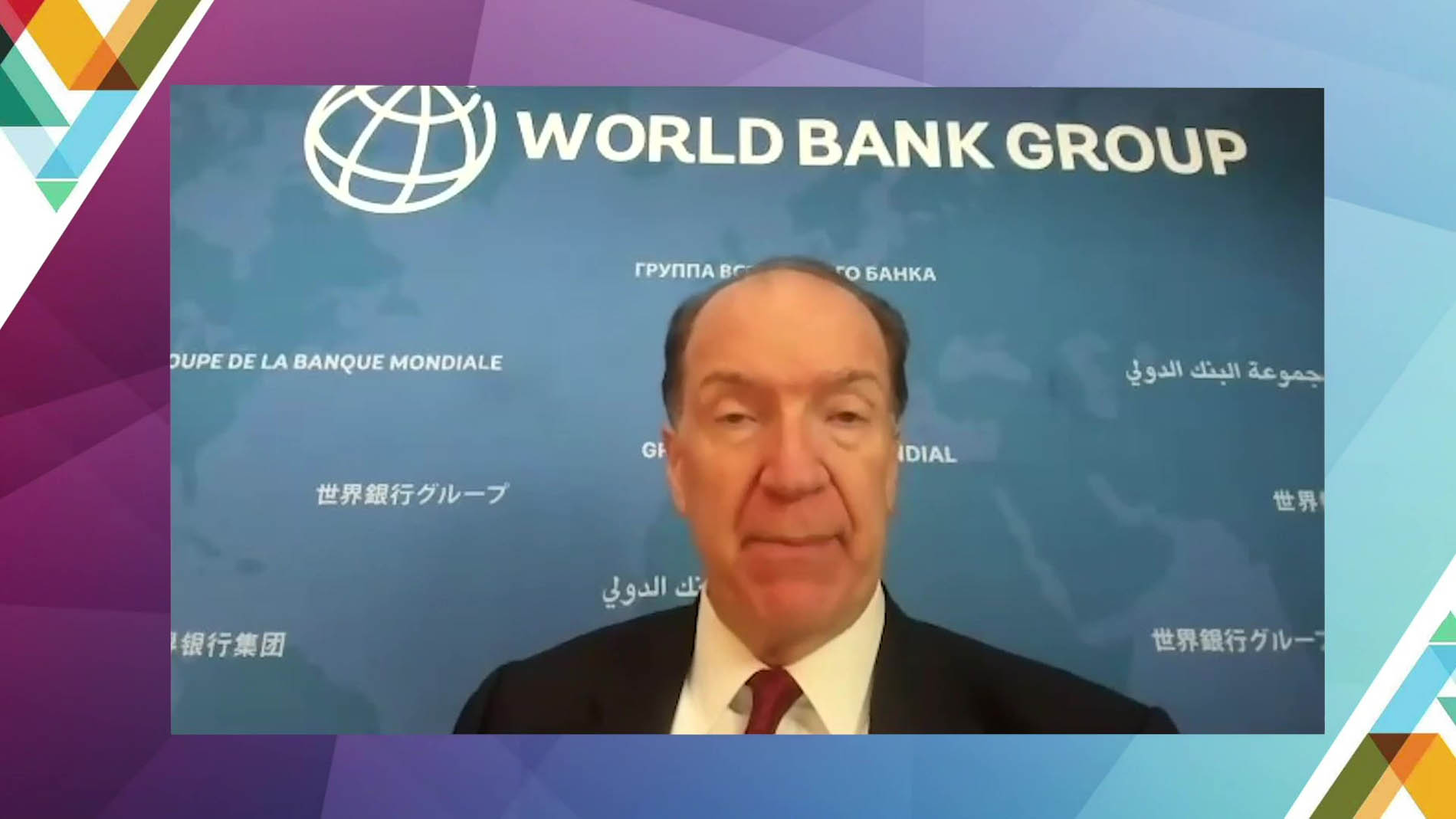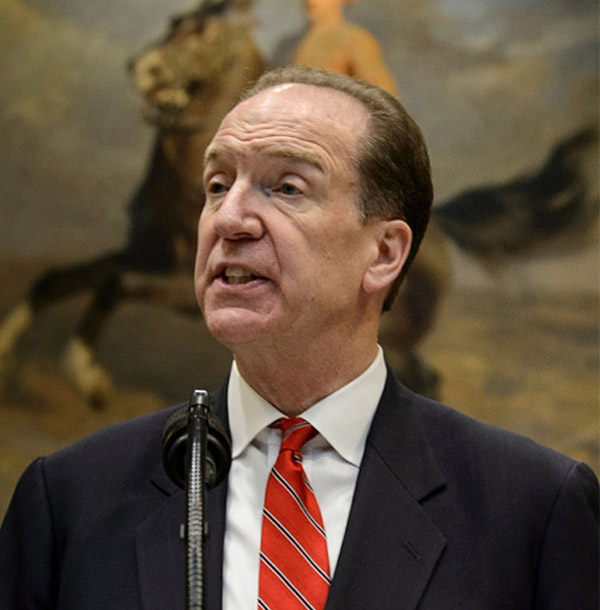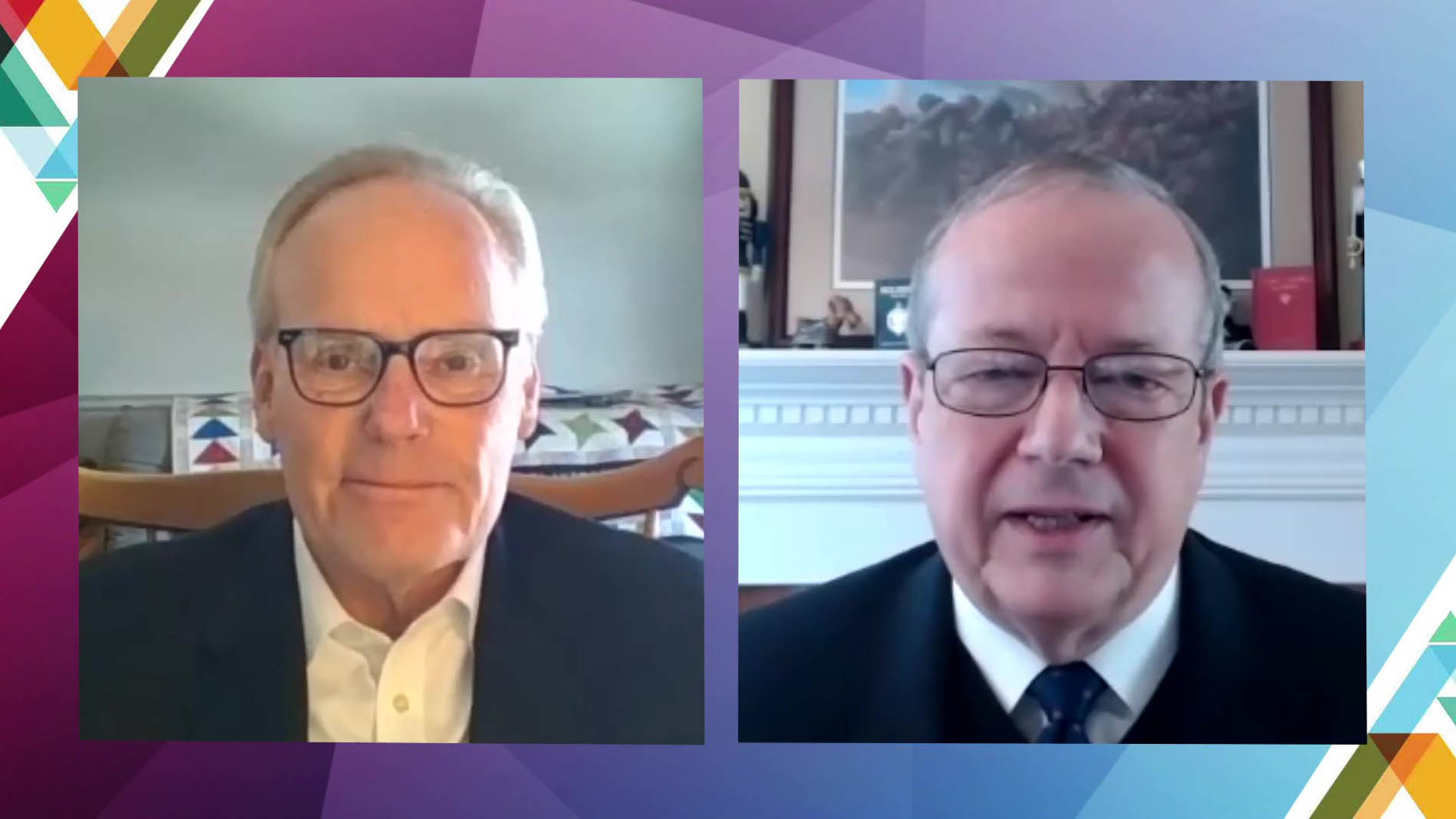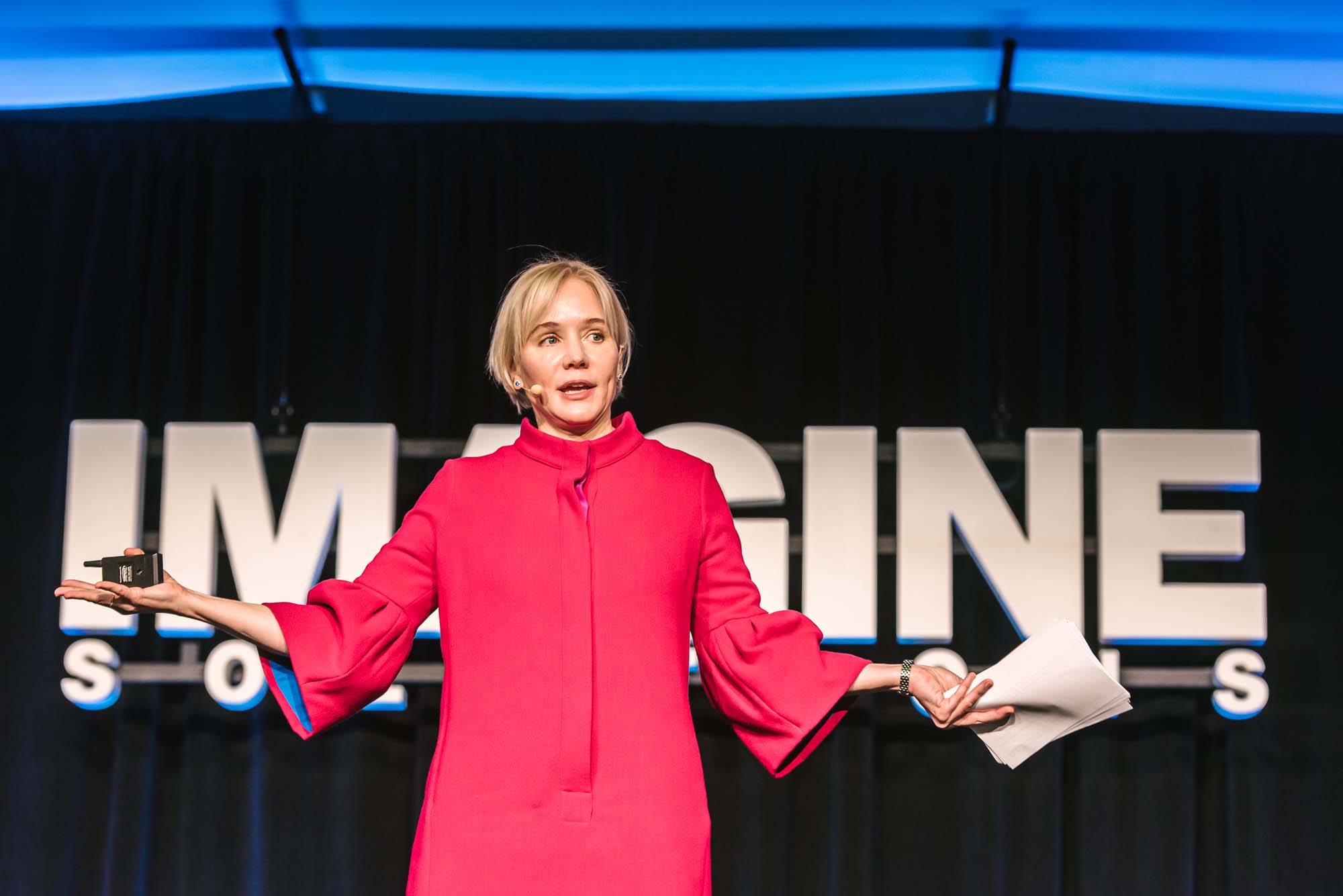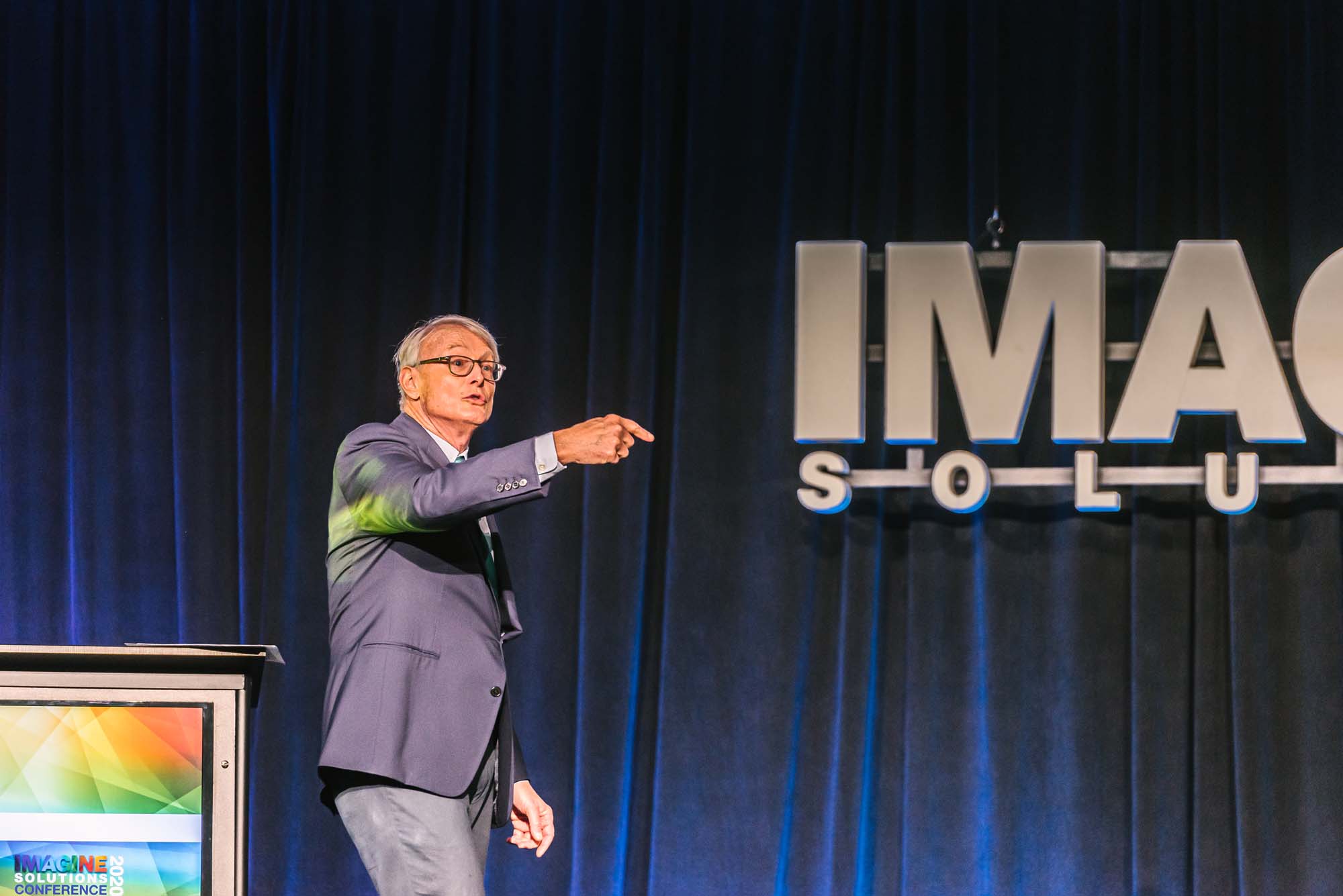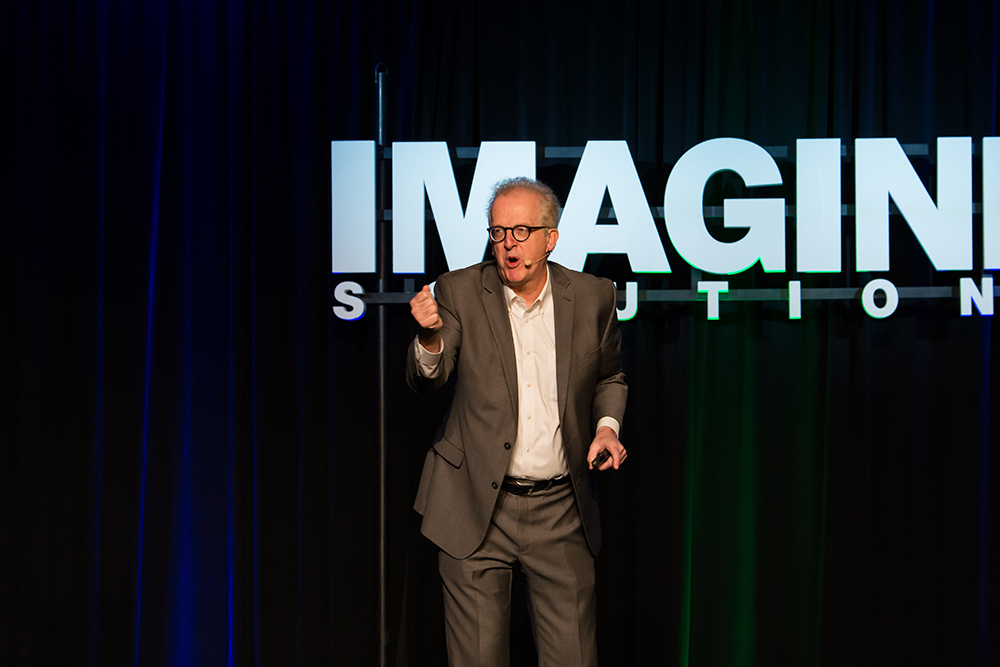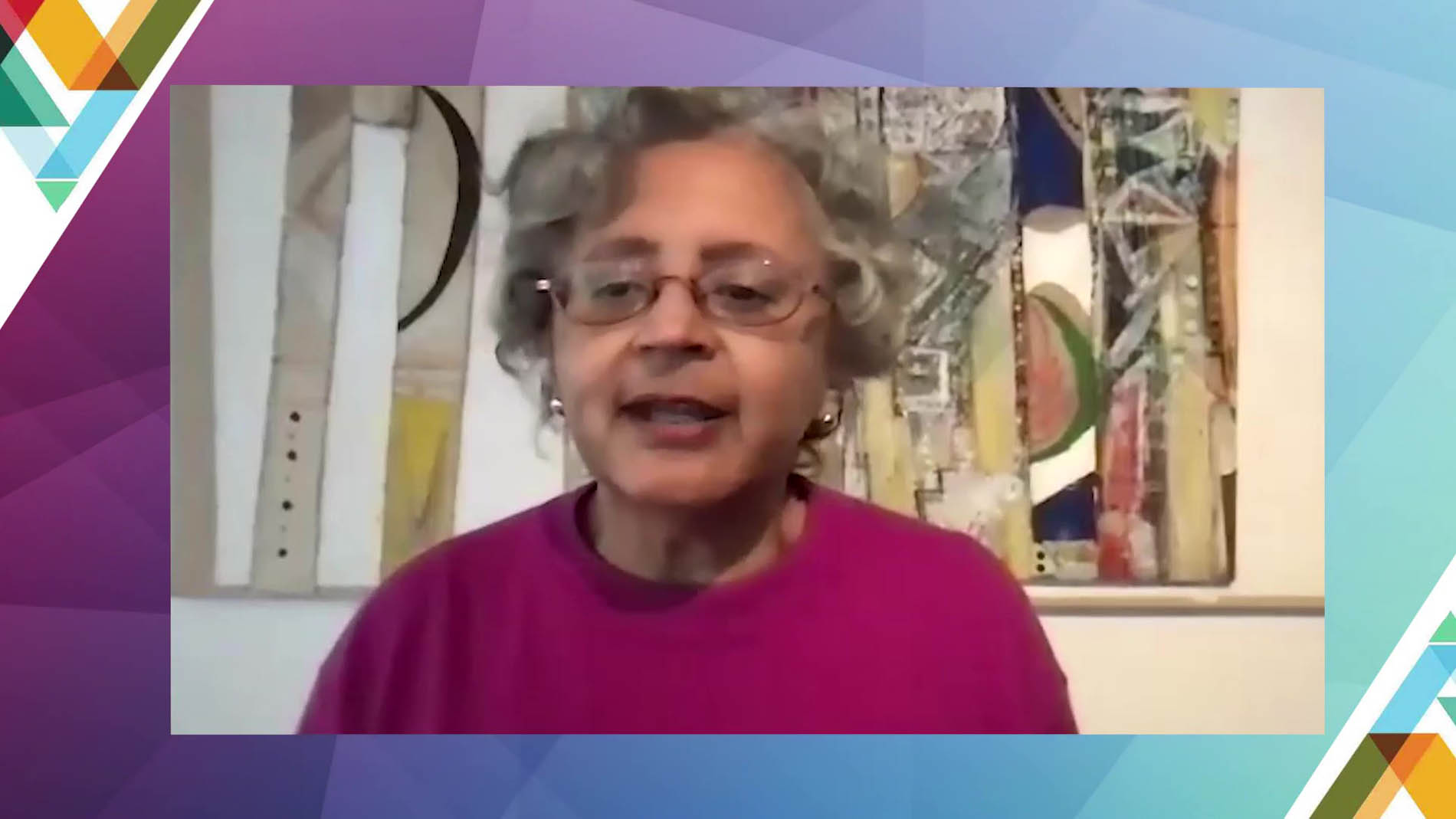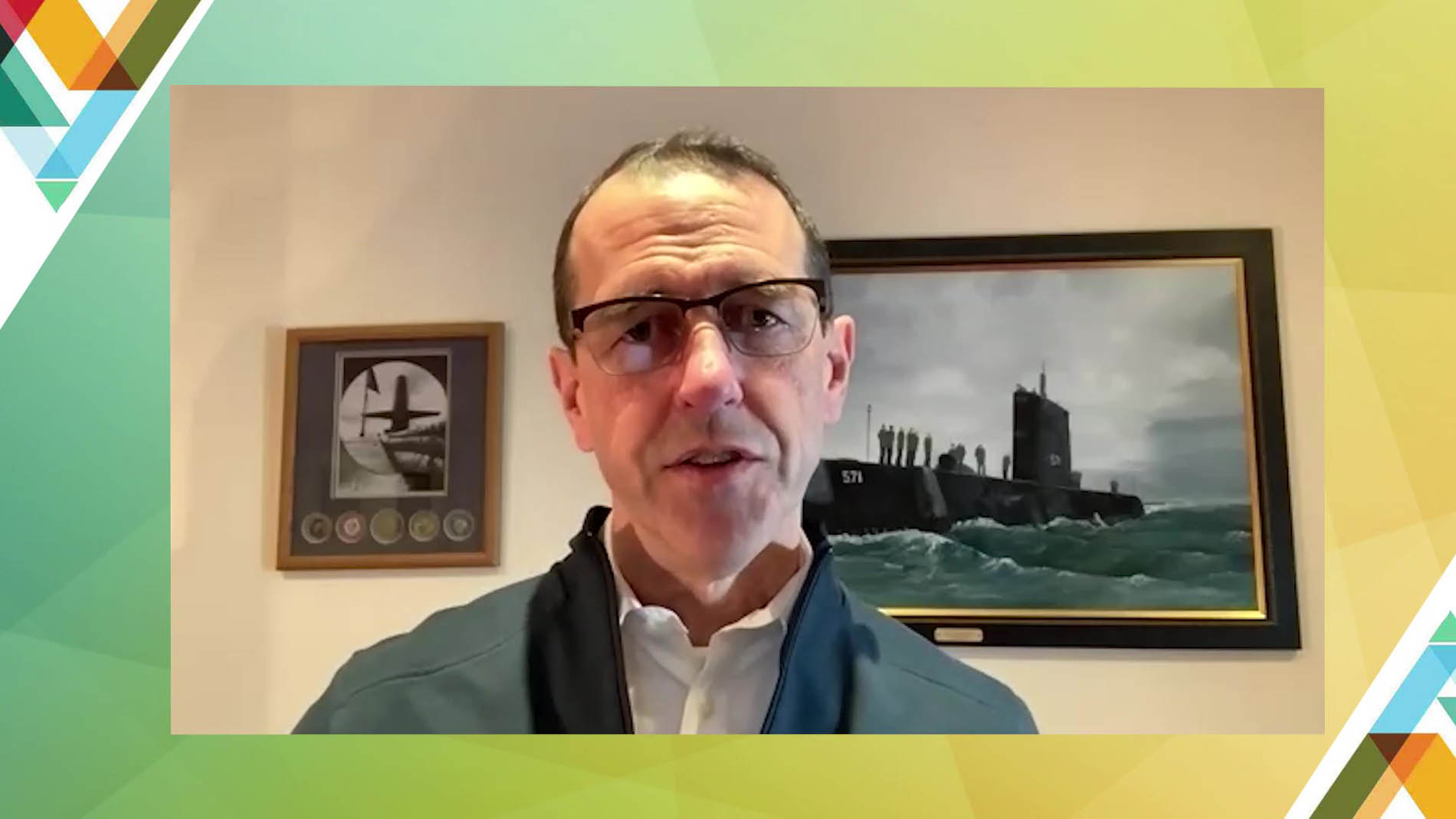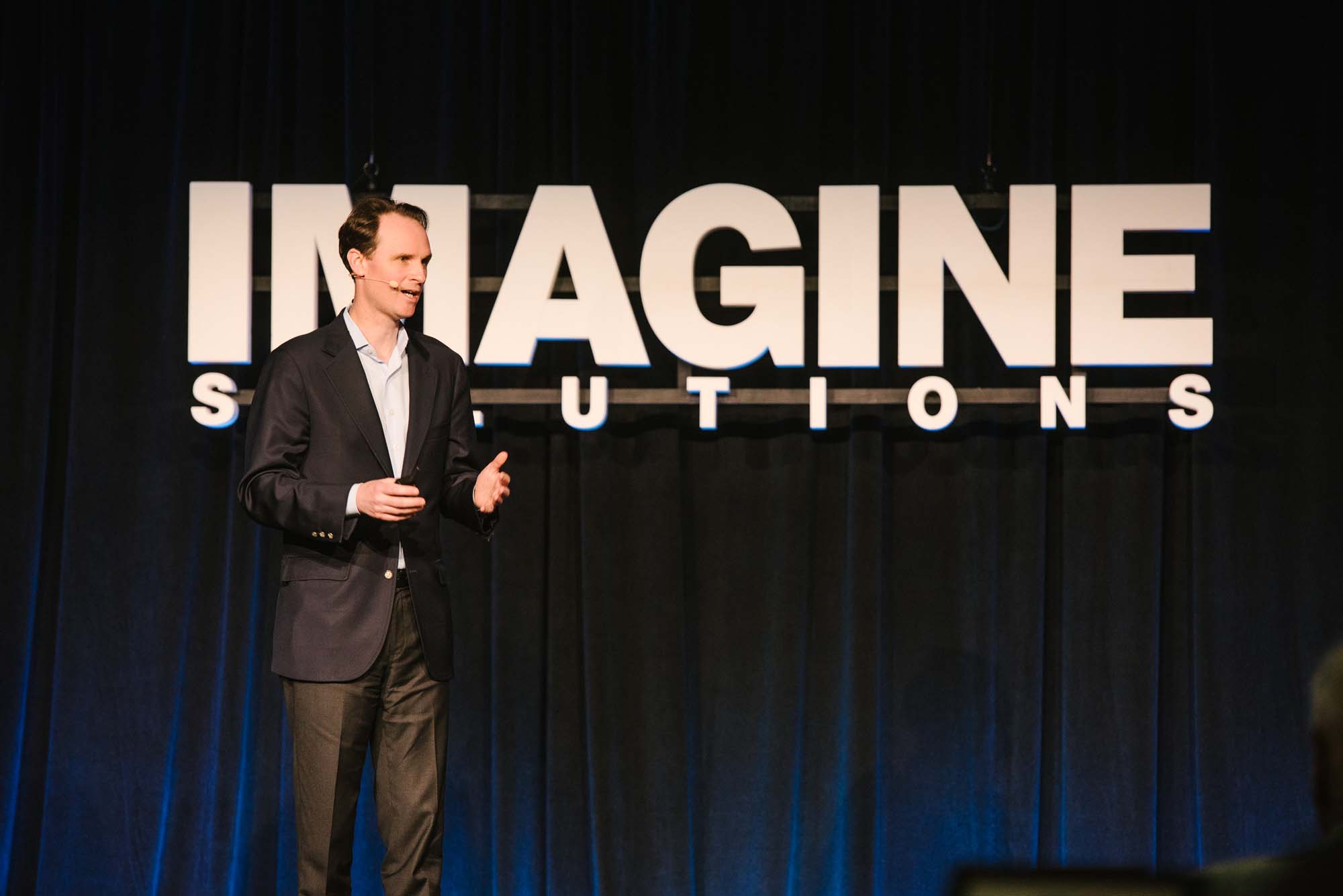World Bank President
World Bank President presents the importance of their work and their priorities for 2021
00.00
our next speaker is david malpass president of the world bank david has a long and distinguished career in american government and private enterprise he's worked at the highest levels of the treasury and state departments in three different administrations dating back to the reagan years he was also a chief economist at bear stearns when there was a bear stearns in his current role david works with countries and ngos to provide financing and technical assistance to help them solve their most intractable problems today he will take us on a world tour and tell us what the bank's global priorities are for 2021 and beyond ladies and gentlemen please welcome david malpass hello everyone uh i'm very pleased to be here today for the uh imagine solutions conference and my special thanks to steve einhorn for the invitation i want to talk with you today about some of the challenges faced at the world bank group
01.00
uh some of the challenges facing the developing world and the global landscape as you know we are we are uh in a whole new world in terms of the economic decline that occurred in 2020 the inequality that's uh built up in the world the importance of vaccines the importance and the the the magnitude of debt overhanging the developing world so these are all challenges that i want to mention and also try to try to lay out some some ideas about what the core of the problem is and what some of the solutions are one that i'm going to mention is the importance of transparency and contracts one of the one of the problems that's built up in the world over the years for the developing countries is the is the lack of transparency in the contracting process and the core importance of contracts within the way the global system works so we should talk about that um i wanted to first describe the world bank
02.00
group uh the world bank is composed of actually five entities i won't go through them all but suffice it to say there's a there's a bank alike entity called ibrd and uh ida which makes loans and and grants to developing countries to the poor poorer countries especially uh it's made up of there's equity capital there's debt uh there's debt that we issue into the markets so in in the previous fiscal year we did over 90 billion dollars of debt uh and uh in in the uh world bank group and it'll be more than that in our current fiscal year because of the surge in lending that's going on in addition to those two uh entities one that's one that's a bank charging interest one that's uh ida which is very soft blown terms or and and heavily grants and it's replenished by donors there's also ifc the international finance corporation uh which uh which has equity capital
03.01
it issues debt uh and it helps fund debt and equity investments in uh in private sector companies uh miga is the multilateral investment guarantee agency uh which which can guarantee political risk which helps enable investments in developing countries which of course is critical to job creation to stability in those uh fragile states and other aspects of development and the the final the fifth one is exid the international center for the settlement of investment disputes which i i won't go into today but it's an aspect of the world banks group groups work all of it focused on how do you get more uh development with the with the clear mission uh that we want to alleviate poverty we want to have shared prosperity meaning all all elements of society moving up in terms of their living standards their median income their their uh their connection with the rest of the
04.01
world their their uh uh participation in in uh global public goods uh in a in a favorable way such as climate change all of those are part of shared prosperity and having a better better uh outlook for the people of developing countries so that's the goal uh and there's a recognition uh that there are many types of tools that a multilateral institution like the world bank group can use with countries to help them in their efforts um i wanted to describe how we're approaching that and then get to some of the real challenges um when i came in at the world bank group in uh in april of 2019 i i had uh uh um been working with the world bank really since the mid-1980s so i was both on on as a staffer on capitol hill at the senate budget committee and then as uh deputy assistant secretary of
05.00
treasury for developing nations uh the world bank was uh was one aspect and an important aspect of the development policies of the united states uh as i came in uh in april of 2019 what i wan i wanted uh the world bank people to think very much in terms of good country outcomes how do we get a development program that really works for countries and for regions within for example the sahel region in africa faces many common problems in terms of of desertification of uh security problems uh and and uh immigration challenges and of course simply living standards how do you how do you make a living in a very harsh environment so as the world bank interacts with that we try to have uh what we we have country directors in very many countries and also in the smaller countries a country manager uh and they're they're part of an operations system within the bank uh that uh with within the world bank
06.02
group uh that uh that uh that tries to identify the tools that will work best in a given country they have dialogue with the governments they create a uh a uh documents within the world bank that frames a a strategy for the for the country and then they bring operations through the operations committee at the bank and the bank will make a grant or a loan a very low interest rate loan or in some cases a floating rate uh currently libor though were were were uh switching over uh rapidly to so for uh or preparing the contracts for the new uh benchmark uh floating interest rate um so all of those activities are core and we wanted to uh i we realigned personnel in 2019 and 2020 and it went smoothly uh to put people closer to their clients so uh that means more people in country
07.00
working with the governments uh though we've we've uh uh there's as in any big organization there's personnel turnover so we've hired very very uh uh effective people in in uh in all parts of the organization uh to benefit this effort and our finances have gone well over that period of time there's been a big capital increase meaning an equity injection uh in the uh ibrd there was a replenishment of ida the soft loan window in december of 2019 enabling 82 billion dollars of financing over the next three years so that's in starting in july of 2020 uh there's the resources to have have a large uh net positive flow to um to the poorest countries and to the developing world as a whole uh and then ifc also had a capital increase in uh that was finished early in 2020 uh
08.00
which is a big expansion of the equity capital of ifc so the though as a result of that funding the bank was able to have a record year in 20 uh in calendar year 2020 it was up 45 percent uh in in uh commitments uh from calendar year 2019. so that's a big increase it's very powerful uh because of the the funding that's available and also the needs of the of the developing countries so there's there's there's uh a two-way street where the country uh uh needs to want to interact with various parts of the world bank and then the world bank to have resources available for that kind of uh expansion so to to give you some color on how this works um we look at potential programs support programs for individual countries that might be nigeria or kenya or ethiopia or egypt or in in asia
09.02
uh myanmar uh which which has to be examined in in light of of political uh changes in india pakistan bangladesh uh and all of southeast asia indonesia philippines and in latin america most all of the countries have world bank group programs to varying degrees so the that allows uh people the country and the world bank to work together to focus on challenges um and i i want to tell you a couple more uh uh and then and then talk more globally about economic problems uh so in when the pandemic hit in uh april of 20 or march of 2020 uh the world bank group people started working from home that was able to be done quite effectively there was good technology i.t capabilities at the bank and people were able to get a lot of their work done as i said the
10.00
commitments are are up uh uh very large the biggest increase uh on on record i think in calendar 2020 as a result of being able to push operations through the the investment committee and to the board uh for approval so in april and may we worked on very rapid coveted response and we're able to reach 112 countries uh in a in it with with uh with a menu of things that we could help them with such as masks such as personal protective equipment also the the services and consulting that they need in order to be able to combat the covet impact some of that also took the form of social safety net uh support where the world bank is very very engaged we're trying to have systems that target people that are most in need and that means adjusting for some
11.00
countries they need to constantly be updating the uh the list of people that are qualified for the social safety net because happily people do move upward in these countries and and so in order to target the benefits there need to be uh dynamic changes going on in the country so that was part of the program by august and september it became apparent that the vaccines were going to be a challenge for the developing world we set up a program that was approved by the board in uh uh in october for 12 billion dollars of financing for uh vaccine purchases and distribution by developing countries uh so if you you can imagine that might extend to a billion people uh some of the manufacturers are giving discounts for vaccines that are available to developing countries uh and so we're working hard on that but we we did an assessment of countries their readiness for vaccination programs
12.01
and where the gaps are in terms of their logistics their training and tried to fill those gaps in so that was work underway in november and december uh and we were able to do assessments in nearly a hundred countries uh to prepare for vaccination systems and then uh began uh uh bringing operations to the board at the end of january and uh and then into february with individual operations uh uh coming to the board where the country can identify or it can explain what it intends to do with financing and then how the contracts can be uh entered into it presented a lot of challenges from the logistics the training aspect the availability of delivery schedules from the manufacturers so we engaged with both the manufacturers and with kovacs the international facility uh to to uh try to try to uh obtain delivery schedules uh and prices
13.01
and contracting capabilities for for the countries so i wanted to give you that background and that brings me up more to the challenges in 2021 um and i'll identify some and as you know there are many many uh challenges one is inequality meaning the k-shaped recovery that's underway worldwide where uh the upper end goes up and the bottom end has has suffered from uh severe unemployment from the inability to send remittances back home uh to to uh to their families uh the debt burdens that have gone up because of the uh the as a percentage because of the recession itself many of the developing countries have seen their gdp fall by 10 and so their debt to gdp levels have gone up correspondingly so these these are big problems and they add on to the original problems which included health education nutrition
14.00
child development also violence against women uh and uh challenges in incorporating women into the into the workforce uh insecurity or security issues in countries in fragile states all of these are are uh our ones that we're facing in order to address the uh challenges of the developing world ifc was an important element of it in april and in may we identified that countries were and companies were having a very hard time getting trade finance and working capital finance i ifc created a uh an expandable program that was able to reach uh many companies uh and and fill the gap that was that had emerged in the in the markets the the markets were reluctant to do trade finance working capital finance in developing countries during that period of uncertainty and i ifc was able to fill that gap and working with miga created systems to help uh with
15.02
correspondent banking problems with trade problems working capital problems and so that's been a successful effort to try to maintain some of the private sector operations in uh developing countries and that's going to be a critical building block as we go forward into the uh uh into the into the future one of the so as i turn to that longer term now i wanted to explain that we know that the post-covert world is going to be different in many ways from the pre-covert one of the keys for success for the developing uh countries will be their flexibility uh their ability to change into the new environment why a clear example of that is countries that depended on uh on tourism uh will probably have to have a much downsized view of tourism and a different aspect of tourism perhaps greener more about biodiversity more about uh safety and security all of those things
16.02
uh changing the the nature of the experience in the developing countries that's just one example in in every area uh there are changes going on one of the biggest now is the emergence of food insecurity as a critical problem facing uh facing uh many of the fragile countries this is in part due to the economic recession meaning simply less income for people in the countries uh fewer remittances and so less money to buy food and then also challenges facing the crops that are related to climate changes related to uh uh the the yields on crops and the complexity of the international agricultural system i think they're fruitful ways to invest in that for the developing world and so we look at that as agra agra industry agribusiness agra uh policies that are climate friendly uh those are those are one of one of the uh
17.01
many core functions of the world bank joining health education uh uh the vaccination programs the climate uh programs the the uh gender awareness programs that recognize that women are going to be a critical part of a developing country's success uh going forward because they make up a big portion of the potential labor force and earning earning power so all of those are challenges that we face i wanted to turn to the longer term uh longer term as we think about what what how country developing countries can set up i want to mention the importance of their spending uh uh priorities uh their taxation priorities uh and these have been problematic areas uh all through the history of developing uh world we have programs we work with the imf uh carefully on these programs and we also are trying to uh use the debt reduction
18.02
process that's underway now to help channel more resources into the fiscal accounts of the countries so that they can make more choices uh favorable choices for the people of the of the country i want to mention also the challenge of the to to achieve a sustainable debt burden um prior to covet uh 19 there there have been many years of rapidly expanding debt for developing uh countries this poses a challenge for the international financial system because sovereign debt doesn't have a bankruptcy and established bankruptcy process the way company debt does in in uh many of the advanced economies and so it creates a very uh real conflict between the boundaries that countries can push in terms of getting more financing and using it effectively the the litigation and the force of the international rule of law uh that is applied to sovereign debt and
19.02
so i think there's been a somewhat unhealthy process a lack of transparency in the debt itself in the contracts both from the creditor side they don't want to share uh information on what the contract looks like and from the debtor side the government of the country may not want people to know uh what the what the debt contracts look like or what the collateral was that was used to induce the the contract and so these are these are highly problematic even prior to covid and kovitt placed an urgency on resolving this and pushing this uh problem forward what we did in march i called for and joined by crystalina gargriva at the imf called for a suspension of debt payments a moratorium for on the official bilateral credits and the pri private sector credits that are in the poorest countries that's 75 of the poorer countries uh most of many of whom are over indebted had had extend over extended themselves and we need a
20.01
process so the the moratorium was supposed to give time for the international system to sort out some of this some of this set of problems the litigation problem the amount of debt the high interest rates that are charged on quite a bit of the debt the collateral that might be involved in the debt and work to a more sustainable future for the international debt system it's been problematic to implement this because the creditors are reluctant to fully participate both the private sector creditors and some of the official bilateral creditors uh have been uh reluctant to to participate in the meantime the world bank uh group provides a very large positive net flow to the countries to support them as they look for uh for various approaches to dealing with the debt um so that process is ongoing it was featured in the g20 meetings the group of 20 large country meetings that occurred
21.00
in 2020 and it will be also a major part of the agenda in 2021 for both the g20 and for the g7 uh some of the principles that we want to really push forward with are transparency i've mentioned that also an ability to reduce the debt burden for those countries that are in debt distress so if the if the debt to gdp ratio or the debt to export ratios have gotten very high um there needs to be a step down function for the country in terms of the debt burden perhaps through a very generous rescheduling of the debt of both the private sector creditors and the official bilateral creditors so we're we're working on ways working with the imf on ways to get that done and individual countries it will go on a case-by-case basis but there's there's the this broader challenge that the debt is simply uh too heavy for the people of the of the developing countries
22.00
sometimes their governments have a shorter term viewpoint the government wants the money now and and cares a little bit less about what happens five years or ten years from now then the people of the country who are going to reside in that country for decades and their children will be there for decades so we're trying to reconcile the interests of the people of the country with the debtors and creditors who may sign contracts that aren't all that aren't that are unfavorable to the people of the country and that's that's a tall order to to to uh to work out to sort out and that work is going on in uh i wanted to mention another uh challenge which is the nationally determined contributions the indices this is part of the paris agreement countries five years ago put together in sometimes in haste uh commitments to the paris agreement and so sorting those out in a way that's consistent with their development uh
23.00
policies and their development needs the people of the country and having an actually effective uh interaction with climate change so lowering greenhouse gas emissions for example being a higher priority within the country's choice of indices that wasn't necessarily the the highest priority when they were put together uh in the in the previous round of indices so we're working with the countries to try to have effective uh uh address of the climate goals that the country has the paris agreement has uh and consistent with the development uh purposes of the country and effective use of funds as the country for for example there may be many things that a country can do it's important to find the ones that are going to be most effective in the near term to actually address uh the the combined goals of the uh of development and creating a green uh resilient uh recovery for for the world that addresses the climate change
24.00
issues um i want to also mention the broader context of global public goods as as we try to build a green uh uh resilient inclusive uh development process for the developing world it's important that global public goods have avenues for being expressed otherwise it's in one country's interest to ignore the effect it has on other countries and so we have to have economic systems that take this into account the world bank is in is in the center of trying to have countries be aware of their impact on other countries so i'll name uh give you various examples one is the biodiversity where the the farmers in a country may want to uh chop down the rain forest that is not in the interest of people elsewhere in the country or in the world and it's not good economics marine plastics is a critical issue where if it's dumped into
25.00
rivers it goes into the oceans and it accumulates and harms uh different parts of the ecosphere world fisheries are a uh are a classic example of a global public good that needs to be monitored and maintained and expanded well i've uh gone on a while i wanted to give you lots of food for thought i want i want to turn to a uh a tough issue uh maybe a couple more issues one is um as we think about the inequality i want to come back to that the the the way the pandemic hit it exacerbated or made very clear how unequal the world is in terms of the economic uh stabilization and stimulus the fiscal stimulus much of it went to people with higher incomes because they were identified in the system they had jobs uh they they may have lost a formal sector job but people in the informal sector had much uh harder time uh getting getting benefits so there's an inherent uh inequality in the fiscal stimulus the
26.02
bigger the stimulus the more uh the inequality that can come out of that it's important to target that kind of stimulus and also i think very important to have it funded with long maturity debt i think governments uh to in in in the in the crisis itself issued a lot of short-term debt and i think that should be rolled into longer term debt very aggressively by the uh by the advanced economies um there was also a huge amount of monetary stimulus that took the form of central banks uh borrowing from banks through this excess reserve process and buying largely long-term debt instruments uh from the market which inherently pushes money into the concentrated upper income sectors of of the society um the and and the the magnitude of this uh shift this inequality shift is is gigantic because of the amounts of
27.00
debt that were that were moved in this direction the amounts of long long-term long-duration instruments owned by the world's central banks has gone uh way up uh and so i think one thing that would soften the damage from that the inequality damage is to shorten the maturity of the instruments and also shorten the credit risk or reduce the credit risk of the long-term instruments that are that are taken by the central banks um so with that um i i conclude we're we're living in this drastically changed world we're in a low for long interest rate environment that hasn't been reconciled with finance theory with the idea of return on investment with the idea of of what some of the limits on equity valuation are if uh interest rates are truly very low for a long time and those i think financial theories or or models need to be discussed and
28.00
worked out and then applied also to investments in developing countries they often they're they're very much getting less funding because they don't qualify within the within the risk metrics uh that the that the world has set out so we're left with a flaw in the system from the from the debt uh from the debt world standpoint so if our goal is to help people and i think we all live on the same planet and we can recognize that there are clear benefits from from people in developing countries doing better that reduces refugee flow that reduces the the tensions in the world and the political risk the military risks some of the security risks i think we need to practice much more aggressively transparency in contracting uh identifying low-cost digital systems that will allow people to participate more fully in their economies even the poorest should be able to transact in this world where where financial transactions can be done at
29.02
that fraction fractions of a cent on the on the dollar and lower carbon uh progress in terms of the transition fuels that can be used for cooking for electricity generation all of these uh systems that need to be updated and uh and made uh transparent and made very uh within urgency that includes vaccinations that includes uh rule of law changes that improve the outlook for all of the developing world with with that thank you very much i hope it's been interesting i look forward to input from people we work closely with imf with our shareholders with uh other other international institutions with civil society organizations and of course very much with the private sector in the business community where lots and lots of the jobs need to be created so i wish you all uh good good fortune in your in your
30.00
activities thanks

